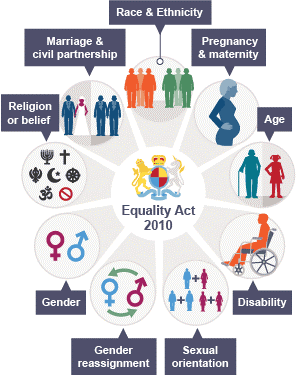The Equality Act became law in 2010. It covers everyone in Britain and protects people from discrimination, harassment and victimisation.
The Equality Act protects people against discrimination because of the protected characteristics that we all have.
Under the Equality Act, there are nine protected characteristics:
- Age
- Disability
- Gender reassignment
- Race – including colour, nationality, ethnic or national origin
- Religion or belief
- Marriage or civil partnership
- Sex
- Sexual orientation
- Pregnancy and maternity
No form of discrimination is tolerated at Andrews’ Endowed CE Primary School and our pupils show respect for those who share the protected characteristics.
We do not teach about all the protected characteristics in every year group. The curriculum is planned and delivered so that our pupils develop age appropriate knowledge and understanding during their time at Andrews’ Endowed CE Primary School.
The 9 Protected Characteristics are actively promoted in school through:
- Our school ethos statements, SIP, and SEF
- Our school core values
- Our school behaviour policy
- Conscious role modelling by all adults in the school community
- Active engagement and communication with parents and carers
- Collective Worships
- British Values themes
- Discussion within curriculum subjects, taking a cross-curricular approach
- Promoting articulation by building appropriate language and a coherent vocabulary
- Personal, Social, Health and Economic education (PSHE) sessions
- Religious Education (RE) lessons, RSE lessons and Protected Characteristic talks
- Sporting, Art and Cultural Events
- Pupil Voice
- Educational visits
- Real-life learning outside the classroom
- Guest speakers
- Developing links with local, national and international communities
- Extra-curricular activities, after-school clubs, charity work and work within the local community
Embedding Protected Characteristics into the whole ethos of Andrews’ Endowed promotes:
- Self-esteem, self-knowledge and self-confidence
- Respect for democracy and support for participation in the democratic process
- Acceptance of responsibility for their own behaviour
- Respect for their own and other cultures
- Understanding of how they can contribute positively to school and home life and to the lives of those living and working in the locality and further afield
- An understanding of Equality, Human Rights and Protected Characteristics
- An understanding of how citizens can influence decision-making through the democratic process
- An appreciation that living under the rule of law protects individual citizens and is essential for their wellbeing and safety
- An understanding that the freedom to choose and hold other faiths and beliefs is protected in law
- An acceptance that other people having different faiths or beliefs to oneself (or having none) should be accepted and tolerated, and should not be the cause of prejudicial or discriminatory behaviour
- An understanding of the importance of identifying and combating discrimination

